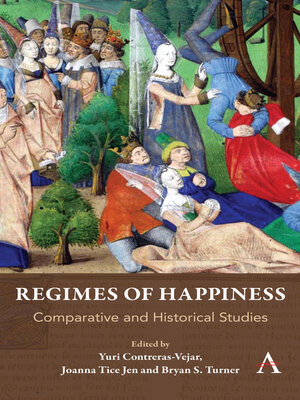Regimes of Happiness
ebook ∣ Comparative and Historical Studies · Anthem Religion and Society
By Yuri Contreras-Vejar

Sign up to save your library
With an OverDrive account, you can save your favorite libraries for at-a-glance information about availability. Find out more about OverDrive accounts.
Find this title in Libby, the library reading app by OverDrive.



Search for a digital library with this title
Title found at these libraries:
| Library Name | Distance |
|---|---|
| Loading... |
'Regimes of Happiness' is a comparative and historical analysis of how human societies have articulated and enacted distinctive notions of human fulfillment, determining divergent moral, ethical and religious traditions, and incommensurate and conflicting understanding of the meaning of the 'good life'. A two-part book, it provides a historical view of the way in which Western societies, the descendants of the Latin Roman Empire, created languages and institutions that established specifi c and occasionally antithetical conceptions of a fulfilled human life or 'happiness' in the first part. In the second part, it explores how non-Western societies and non-Christian religions have conceived and established their own ideals of human perfection. 'Regimes of Happiness' is a critical reflection on modern notions of happiness which are typically focused on individual feelings of pleasure.
|'Regimes of Happiness' is a comparative and historical analysis of how human societies have articulated and enacted distinctive notions of human fulfillment, determining divergent moral, ethical and religious traditions and incommensurate and conflicting understanding of the meaning of the 'good life'.
Presented in two parts, 'Regimes of Happiness' provides a historical view of the way in which Western societies, the descendants of the Latin Roman Empire, created languages and institutions that established specific and occasionally antithetical conceptions of a fulfilled human life or 'happiness' in the first part. The second part explores how non-Western societies and non-Christian religions have conceived and established their own ideals of human perfection. 'Regimes of Happiness' is a critical reflection on modern notions of happiness which are typically focused on individual feelings of pleasure.







